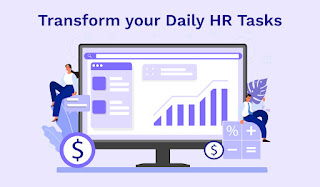How HRMS and Payroll Software Can Transform Your Business
In
the dynamic world of business, staying competitive and efficient is essential.
Human resources (HR) and payroll functions are crucial pillars of any
organization, regardless of its size. Traditionally, managing HR and payroll
processes involved a considerable amount of paperwork, manual calculations, and
administrative burden. However, with the advent of HRMS and payroll software, businesses, including
small enterprises, now have the opportunity to streamline their operations and
enhance overall productivity. In this blog post, we'll explore how HRMS payroll
software can transform your business and why it's particularly beneficial for
small businesses.
Benefits for Small Businesses
By
offering a suite of comprehensive tools, the HR and Payroll software
systems not only simplify administrative tasks but also empower businesses to
enhance employee satisfaction, ensure regulatory compliance, and allocate
resources more strategically. Here are the myriad benefits that HR and payroll
software bring to small businesses, shedding light on how these technological
advancements are reshaping the way organizations manage their personnel and
financial aspects.
Efficiency Enhancement- Small businesses often operate with limited resources, making
efficiency a top priority. HRMS payroll software streamlines time-consuming
tasks like data entry, payroll processing, and report generation. This
automation frees up HR personnel to focus on more strategic initiatives like
talent management and employee development.
Accurate Payroll Processing- Manual payroll calculations are prone to
errors, which can lead to dissatisfied employees and regulatory compliance
issues. HRMS payroll software performs accurate calculations based on tax laws,
deductions, and company policies, ensuring employees are paid correctly and on
time.
Compliance and Reporting- Staying compliant with labor laws, tax regulations, and
reporting requirements is crucial for every business. HR and payroll software for
small businesses helps them stay up-to-date with changing regulations,
reducing the risk of legal penalties. It also generates accurate reports for
audits and internal analysis.
Employee Self-Service- Modern employees prefer self-service options that empower
them to manage their own information. HRMS payroll software provides a secure
portal where employees can access their payslips, tax documents, and update
personal information, reducing the HR team's administrative workload.
Data Security-
Handling sensitive employee information requires robust security measures. HRMS
payroll software offers data encryption, access controls, and regular backups
to ensure the confidentiality and integrity of employee data.
Cost Savings-
While investing in HRMS payroll software may seem like an initial expense, it's
a cost-effective solution in the long run. The reduction in manual labor, paper
usage, and potential errors leads to significant cost savings over time.
Scalability-
As small businesses grow, managing HR and payroll processes for an expanding
workforce can become overwhelming. HRMS payroll software is
scalable, accommodating the company's growth without disrupting operations or
requiring extensive system changes.
Time Management-
Automating HR and payroll tasks frees up valuable time for HR professionals.
This time can be reinvested in strategic initiatives like recruitment, employee
engagement, and skill development, contributing to overall business success.
Making the Transition
Implementing
HR software with integrated payroll
management requires careful planning and training. Here are some steps to
ensure a successful transition:
Assessment: Evaluate your business needs and choose
an HRMS payroll software that aligns with your requirements.
Data
Migration:
Transfer existing employee data into the new system accurately.
Customization: Configure the software to match your
company's policies, tax structure, and pay cycles.
Training: Train HR staff and employees to
effectively use the new system.
Testing: Conduct thorough testing to identify and
address any issues before going live.
Continuous
Support: Provide ongoing support
and updates to ensure the software operates smoothly.
Conclusion
The
integration of HR and payroll functions through HRMS payroll software brings
numerous benefits to businesses, particularly small enterprises looking to
optimize their operations. From efficiency gains and accurate payroll
processing to compliance management and employee self-service, the advantages
are compelling. As businesses continue to adapt to changing technology
landscapes, embracing HR
and payroll software has become a strategic move to transform HR and
payroll processes and drive overall business success.
Opportune
HR's HR and Payroll Software stands out as an exceptional choice for businesses
seeking streamlined HR and payroll management. With its user-friendly
interface, robust features, and scalability, it caters seamlessly to the needs
of small and growing enterprises. From automating payroll processes to
simplifying employee data management, Opportune HR's software offers a comprehensive solution that optimizes
operations, enhances accuracy, and promotes overall organizational efficiency.




Comments
Post a Comment